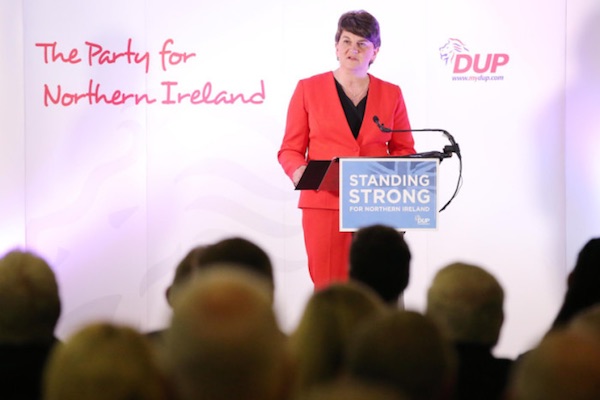
A decoy talks proposal by Democratic Unionist Party (DUP) leader Arlene Foster for a ‘parallel’ process alongside the Stormont Assembly has been dismissed by northern nationalists as an attempt to muddy the political waters.
After a decade of sharing power in Belfast with Sinn Fein, the DUP remains bitterly opposed to implementing previous talks agreements, such as legislating for the rights of Irish speakers, as well as broader equality and legacy issues.
Talks aimed at restoring the devolved institutions collapsed without agreement in June. Foster this week repeated claims that Sinn Fein have “built a barrier” to the return of Stormont by demanding implementation.
Seeking to return as the North’s First Minister despite a recent financial scandal centred on her actions, she claimed the northern executive could be restored immediately by using a “time-limited” parallel process to deal with language and culture issues.
Despite growing doubts about the future of power-sharing between the two parties, Foster claimed another talks process is “a waste of time”, and that her proposal was a “common sense solution”.
“Put ministers back into posts so that decisions can be made and that Northern Ireland can have a government again,” she told a DUP meeting in Belfast.
However, Sinn Fein’s northern leader Michelle O’Neill was unimpressed. She said only talks could “build a sustainable executive that will last”.
“For over ten years [the late Sinn Fein leader, Martin McGuinness] maintained the executive while seeking to have the outstanding commitments of the agreements implemented with respect and equality for all,” she said.
“Over this period the DUP and the British government refused to honor the agreements and operate powersharing on the basis of equality. On that basis Martin McGuiness resigned.
“The statement by the DUP leader demonstrates that they have not listened or acknowledged the reasons of Martin’s resignation. Establishing an executive that may collapse after a matter of months on the same issues will only fail all our people.”
She said the DUP offer was one they knew would be rejected, as it had been previously, and accused the British government of “continually pandering” to the DUP’s approach. “Therein lies the problem at the heart of the political crisis,” she said.
SDLP leader Colum Eastwood branded Foster’s speech a “missed opportunity to show real leadership”. He pointed out that there was nothing concrete in the speech to confirm she was offering an olive branch regarding an Irish Language Act.
He said: “If this is a signal towards a change of position from the DUP on a standalone Irish Language Act, then we welcome that, but there is nothing explicit in these remarks to confirm that yet. The proposals made are not a credible solution to the challenges we face, and the DUP leader knows that.
“They are the definition of kicking the can down the road. Anything that can be agreed in a time-limited parallel process can be agreed now,” he said.
“Time is not the issue, a critical lack of political generosity is,” he added. “There is an emerging battle to shift blame rather than proposing credible solutions.”
Foster’s high-profile statement became political grist in Dublin, where both main right-wing parties used it to attack Sinn Fein.
The Dublin government’s foreign affairs minister, Simon Coveney, claimed that Mrs Foster’s intervention was a “genuine effort to show leadership and reach out towards compromise”. And in an attack on Sinn Fein Fianna Fail leader Micheal Martin said the Irish language act should now be used as a “political pawn”.
Sinn Fein leader Gerry Adams said their remarks were disappointing.
“Teachta Martin has never failed to use difficulties with the political process in the north to attack Sinn Fein - he conveniently forgets the calls he repeatedly made, not so long ago, for the assembly to be suspended,” he said.
Mr Adams said: “Let’s be very, very clear - there won’t be an Assembly without an Acht na Gaelige [Irish Language Act]. The DUP know that, the governments know that.
“I understand that there are elements within unionism who think that this is in some way threatening but it’s a matter of whether we want this part of the island to embrace everyone.
“You don’t have to agree with everyone but you do have to have a legislative basis for respect and that includes the Irish language act.”
Politicians from five of the main parties in the North have now declared their support an Irish language act, and a clear majority of politicians at Stormont now support the rights being enshrined in legislation, as they are in Scotland and Wales for Scottish Gaelic and Welsh, respectively.
The SDLP’s Nichola Mallon, Alliance’s Paula Bradshaw, Green Party leader Steven Agnew and People Before Profit’s Gerry Carroll joined Mr Adams in a show of broad support for the campaign on Wednesday.
Ms Mallon said the Irish language was a critical issue for the restoration of devolution, while Green Party leader Steven Agnew said it wasn’t a “demand of one party”.
But resistance among unionists to equality for nationalists remains implacable. An example was provided this week by former Ulster Unionist Party deputy leader John Taylor, who now goes by the name ‘Lord Kilclooney’,
Taylor tweeted that “politically unionists are the majority so the two are not equals”.
By way of clarification, he said he believed in “equal opportunity”, but added: “When it comes to equality, which is the word used by Sinn Fein, they are a political minority in Northern Ireland.”
His comments were condemned by Sinn Fein’s Mairtin O Muilleoir, who said: “If I am not misinterpreting him really what he is saying is that we (nationalists) will have to stay at the back of the bus. When it comes to some of the core issues of rights that nationalists just have to get in the queue.”
![[Irish Republican News]](https://republican-news.org/graphics/title_gifs/rn.gif)
![[Irish Republican News]](https://republican-news.org/graphics/title_gifs/harp.gif)

